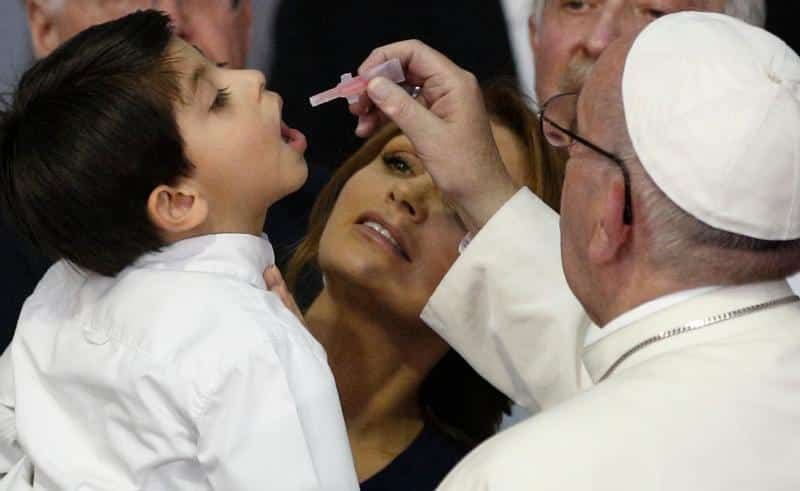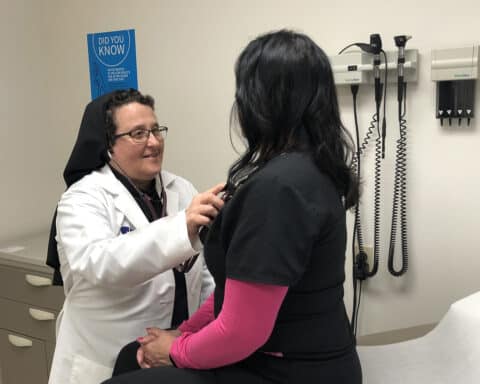Vaccinating our children is again in the middle of a national debate about public health, parental responsibility and personal rights. Many Catholic parents are wondering what the Church teaches on vaccination — especially about the moral implications of using certain vaccines — or are concerned about the role the government may play in mandating those vaccines or others.
Our Sunday Visitor spoke with four figures familiar with this bioethical debate.
Cooperation with evil?
First: an uncomfortable reality. Some commonly used vaccines use cell lines WI-38 and MRC-5, which are derived from tissue from human fetuses voluntarily aborted in 1964 and 1970. This means the vaccines were made using descended cells as a medium and went through multiple divisions before they were used in vaccine manufacturing.
“There were diploid cell lines taken from those four aborted fetuses that have been used over and over again in biomedical research and development of a number of products,” said Marie Hilliard, director of bioethics and public policy at the National Catholic Bioethics Center (NCBC) in Philadelphia. “The reasons for the abortions in this case were not related to the vaccines. And, with these vaccines, no new unborn children are being aborted for the purpose of research.”
Yet the fact that some vaccines — such as those against hepatitis A, (some) rabies, rubella, varicella and zoster — have a distant historical connection with abortion poses a moral dilemma, she said.
The Vatican’s response has been prudential and clear. According to a 2005 study from the Vatican’s Pontifical Academy for Life, titled “Moral Reflections on Vaccines Prepared from Cells Derived from Aborted Human Fetuses,” the use of vaccines created from fetal cells carry out “a form of very remote mediate material cooperation” with evil, and parents should use alternative vaccines when possible.
Explaining the different levels of cooperation with evil, the study states that people closely involved in the original abortions with the intent of ending human life acted immorally by formally cooperating with evil. Those who then used the aborted fetus cell lines to produce the vaccines and those who marketed them are engaged in “passive material cooperation,” which is illicit.
But doctors and parents who used the vaccines for health reasons are, again, carrying out “a form of very remote material cooperation,” reflecting a “very mild” immoral act, it continued.
The NCBC agrees. On its website, it states that the public health good resulting from vaccines developed from cell lines of aborted fetuses outweighs the distant cooperation with evil of abortions that took place 50 years ago.
The academy’s study also said that Catholics may use morally questionable vaccines on a temporary basis if the population is “exposed to considerable dangers to their health.”
Parents can, however, abstain from receiving these vaccines when there is no alternative available — provided “it can be done without causing children, and indirectly the population as whole, to undergo significant risks to their health,” the study said.
The academy concluded its study saying that even when it is permissible to temporarily use those vaccines, “such cooperation occurs in a context of moral coercion of the conscience of parents, who are forced to choose to act against their conscience or otherwise, to put the health of their children and of the population as a whole at risk.” It went on to say that this unjust choice due to lack of licit alternatives “must be eliminated as soon as possible.”
“There remains a moral duty to continue to fight and to employ every lawful means in order to make life difficult for the pharmaceutical industries which act unscrupulously and unethically,” the academy said.
The common good
Mark Latkovic, a professor of moral and systematic theology at Sacred Heart Major Seminary in Detroit, said that to get a full picture on the Church’s stand on using these vaccines, one must also look at statements from the Congregation for the Doctrine of the Faith, such as Donum Vitae (“The Gift of Life”) in 1987 and Dignitas Personae (“The Dignity of the Person”) in 2008.
| By the Numbers |
|---|
|
The following statistics from the U.S. Centers for Disease Control and Prevention show the annual number of reported cases for several diseases before the availability of a vaccine and the number of reported cases in 2012. Disease Pre-vaccine 2012 Diphtheria 175,885 1
Tetanus 1,314 36
Measles 503,282 55
Mumps 152,209 229
Rubella: 47,745 9
|
Donum Vitae provided instructions on the respect for human life in its origin and clarified moral questions on biological research by saying, “The corpses of human embryos and foetuses, whether they have been deliberately aborted or not, must be respected just as the remains of other human beings.”
According to Dignitas Personae, grave reasons may be morally proportionate to justify the temporary use of such biological material. “Danger to the health of children could permit parents to use a vaccine which was developed using cell lines of illicit origin, while keeping in mind that everyone has the duty to make known their disagreement and to ask that their healthcare system make other types of vaccines available,” the 2008 document stated.
“These documents speak to the dignity of the human person because of the ongoing problem of biomedical research historically using the diploid cell lines of aborted fetuses, and that is still happening now with embryonic research,” Hilliard said. “The difference with the vaccine that we are talking about here is that no new fetuses are being destroyed in the production of vaccines.”
Hilliard said one grave reason to use those vaccines is to protect those who are vulnerable to communicable diseases, such as patients with compromised immune systems, children too young to be vaccinated, those with allergies to vaccine components and pregnant women. Having most of the population inoculated reduces the risks for people who cannot get vaccinated.
As the study says: “The burden … cannot and must not fall on innocent children and on the health situation of the population — especially with regard to pregnant women” who may be vulnerable.
Joseph Capizzi, associate professor of moral theology at The Catholic University of America in Washington, D.C., said that, in general, parents have an obligation to protect their children against diseases and participate in the protection of the common good.
“There are no explicit doctrines with regards to (every type of) vaccination other than what it says about any medicine or therapies: that we have the responsibility for the appropriate care of ourselves and the children on our charge,” Capizzi said. “We would weigh the health of those around our children and ourselves as factors as we consider whether to vaccinate or not.”
Further considerations
Dr. Steven White, past-president of the Catholic Medical Association and current chair of the association’s health care policy committee, said Catholic doctors were concerned that the controversy regarding immoral vaccines would reduce the use of the effective and morally legitimate ones, potentially risking the health of the population at large. “We need to be honest in explaining the benefits and risks regarding the vaccines and any medical therapy that we recommend,” White said. “Doctors have a duty to dispel myths about the risks of vaccination that have been overemphasized and blown out of proportion,” making people think minimal risks outweigh vaccines’ benefits.
“This is simply not true,” he said. “As Catholic physicians, we recognize the incredible value of vaccinations not only today but in the last century in eradicating diseases that many people are not familiar with anymore” including polio, rubella, smallpox, diphtheria, whooping cough, tetanus and others.
Another myth is the debunked — and retracted in 2010 — report linking the measles, mumps and rubella vaccine to autism in young children. The report, published in 1998, led to many parents refusing to vaccinate their children against measles. “We have to avail ourselves of the best science before coming to conclusions and making judgments,” Capizzi said. That does not mean that we simply follow science, but it does mean that, as Catholics, we should not be swayed” by fears devoid of scientific basis.
From a medical point of view, White emphasized that using some vaccines produced with fetal cells because there is no alternative in the United States does not mean they are condoning it as something that should continue to be used indefinitely.
“It is legitimate to use in a temporary basis insomuch that is necessary to protect the health of the individual and the community,” White said. “The parents and the physicians have an obligation to make it known to physicians, or [the pharmaceutical company] Merck, or the FDA that this is something that is unacceptable for them and it should be changed.”
The role of the state
In 2014, there were 23 outbreaks and 644 cases of measles in the United States, the greatest number of cases since measles’ elimination was documented in 2000. The Centers for Disease Control and Prevention’s website said that a possible re-establishment of measles can happen if vaccine coverage levels decrease, which occurs when people forget to get inoculated, don’t know they need to be vaccinated, or refuse vaccination for religious, philosophical or personal reasons.
All 50 states require children to receive a certain schedule of vaccination before they start preschool or school unless the child has a medical condition that would make inoculation risky. Nearly all states, however, allow for a religious exemption from receiving vaccines going against a person’s faith, while 20 offer some sort of personal exemption.
“Our Catholic faith has said that it is morally tolerable to have their children have these vaccines in the absence of an alternative and because of the public health imperative,” Hilliard said. “(It) has not exempted parents from vaccinating their children and, in fact, has gone a little bit stronger, saying that parents should feel a strong obligation” to do so, considering the severity of the diseases involved.
Capizzi, on the other hand, said parents should be allowed to make these judgments, and it is beneficial that the states let people uphold religious convictions and give their informed consent.
“We realize as Catholics that the primary responsibility of the health, upbringing and education of the children is the parents’; and that respect for parents’ consciences must be upheld,” White added. “The government’s role is to protect the common good — in this case public health — to make certain that the pharmaceutical companies are producing safe, effective and ethical vaccines.”
Capizzi said that sometimes parents will conclude in conscience they should not vaccinate their children because of a vaccine that is morally wrong. Making clear that usually they should follow this conscientious decision, he said that, given his understanding of the Church’s position on this topic, “They should reopen reflection in their relationship with that evil.”
“From the perspective of parents that are considering vaccinating their children against certain kinds of diseases like the German measles — which is a significant condition and not to vaccinate exposes them to transmit it to others — in a situation like that, the relationship with that evil is remote enough that a parent would not be participating in that evil by vaccinating their child,” Capizzi said.
Latkovic added that any time the government wants to expand its reach by making things mandatory, people become concerned about their rights of conscience and freedom, but, in the case of preventing epidemics, “public health would tend to overrun those legitimate concerns.”
“If there were an outbreak of Ebola and there was a vaccine, we’d have a duty to get it. Even Vatican II talks about religious freedom but we also have to have public order,” Latkovic said. “I tend to lean more on the side of public safety, where you should have your children vaccinated. We can talk about the exceptions, but they should not be the rule.”
Speak out
White said that in keeping with the Vatican documents’ advice, people must use the alternatives to vaccines produced with fetal cells when available. “For example, in the case of children getting the polio combination vaccine with diphtheria, tetanus and pertussis, there are a couple possible combinations,” he said, “One of them, Pentacel, has one component derived from aborted fetal cells; whereas Pediacel is absolutely ethically legitimate.”
White said that Rome’s position that it is permissible to use these vaccines created unethically on a temporary basis should not be misinterpreted as giving moral legitimacy to these vaccines and the techniques with which they were produced. He added that Catholics should ensure that their doctor, hospital and Catholic health systems use the alternatives available.
“We must work diligently and more vigorously to make ethical vaccines available for all people, but particularly for those who in conscience want to abstain,” he said.
Latkovic and the other experts consulted agreed that Catholics should do their best to use ethically produced vaccines. “Parents and other persons, researchers included, have a moral responsibility to make known their moral opposition to how some of these vaccines were initially created,” Latkovic said. “It’s the only way to create a culture of life.”
Maria-Pia Negro Chin writes from New York.





